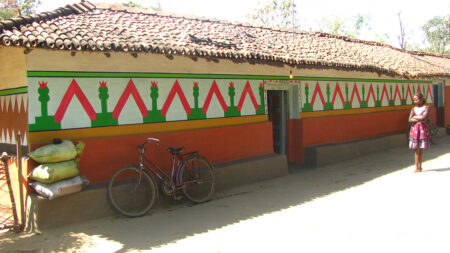Translated from the Hindi by Ruchika Negi
When we started our discussions on crime at the Learning Lab, one thought lingered—if we commit a wrong against a person, that can be called a crime; but if our environment is being harmed, can that be classified as crime as well? We both are from Pakur, which is in Jharkhand. Over the last few months, we worked on some textual and visual notes to understand the environmental impact of mining in Jharkhand, and as a result, the complexity of some of these questions. We are sharing our thoughts here.
Camera: Ashraf Hussain. Sound: Ajfarul Sheikh. Edit: Shivam Rastogi.
Pakur in the mineral-rich state of Jharkhand is known for its black stone all over Asia. It’s considered an important city for its mining and crushing industries. In the early days, many small-scale industries that came up here worked with basic equipment like ghan hathodi (hand hammers) to break and crush the giant stones. Blasting would also be done but in small, contained ways: underground mining, which means tapping and extracting stone from the belly of the earth, leaving behind giant, open holes.
As Pakur became popular for its mines, big industries set up shop here to export this prized black stone. New technologies came. Compressor machines began to be employed for drilling the ground, followed by largescale blasting. Dolomite was used in huge proportions. Blasting now meant loud, shattering sounds that would make the nearby houses and their thresholds shake dangerously. The minute the worker at the mines waved his red flag, a commotion ensued. “Be careful… look out!” When you heard these words, people rushed to herd their cows, goats and other livestock to a safe distance.
But mining meant jobs for people in Malpahari, Salbani, Pipal Jhodi and other areas in the vicinity. This work is definitely dangerous, but even if one was paid paltry amounts, at least there was employment.
Illegal companies, pretending to be legal entities, began to flourish here. Sometimes the administration would become vigilant; at other times, it would simply look the other way. It’s all a game—the ringing of the phone through the political corridors or the jingling of money in some officers’ pockets! But it’s obvious that the minute the land is depleted of the stone, everyone shuts shop and gets busy with some other enterprise. All that is left is that giant hole in the ground.
And now the worry – what if the children who are playing around or the grazing cows and goats fall into this hole? While we were working here, we began to wonder—is this land desperately crying for justice? But if this land, these mines, these companies were not there, how would people get employment? How will they earn? As we kept working, we began to realise that to look at this context through the binaries of a ‘crime’ and a ‘criminal’ is limiting…
Be it summer or winter, these areas are covered in a sheath of dust throughout the year. This dust settles only during heavy rain. But that is because the industries are forced to shut down during these months. Simultaneously, the workers’ hearths also turn cold. As it is, with heavy industrialisation (like the use of JCBs) the demand for local labour has fallen drastically. There’s been an increase in the stone trade, but local employment has slipped day by day. Stone has vanished from most of the lands in Malpahari, Khaprajhola and Sundarpahari. And because more than half the land was converted into mines, it’s now nearly impossible to do rice cultivation there.
In Salbani, the stone mines abut people’s homes. If you stand at the borders of the mining site and the village, it seems like you are standing in the shadow of immense danger.
At one end of the stone mine is Juba Marandi’s tea shop. There was a time when she used to work in the kitchen of the primary school nearby. Her husband was a driver at the mine. During the pandemic, he died, not from the coronavirus but from kala azar, a fever caused by sand flies. Sand flies are typically found in low light conditions and thrive on broken, patchy, mud walls. In Malpahari, Salbani and Khaprajhola, you find many kala azar patients in Sadar Hospital. During the lockdown, Juba’s school also remained closed. This was a crisis for her. What was she to do? Her two daughters and a son study in a school in the city. How would she manage?
On the road in front of her house, stuck to a corner wall, she started her tea shop. But she hardly has any sales. Ever since mining work has dwindled, everyone is just sitting around, unemployed. You can see some men seated in front of her shop playing cards all day. There is no work now. As the procession of the mining trucks came to a halt, it had a cascading effect on the local garages, tyre puncture repair shops, the labourers who would load-unload things, general mine workers, small hotels and tea stalls—silence has descended everywhere, over everything.
So, in addition to the environmental impact of mining in Jharkhand, gross extraction of land has also been a major issue. But on the other, if the mining stops, how will people earn? This is not about big companies and industries—perhaps they can find other ways and means to do business, but what will happen to the local workers? Where will they go? Every year, many migrate to other states from Pakur district in search of a livelihood. Mining had given them some financial relief.
Maybe in Pakur’s context, ‘crime’, ‘need’ and ‘compulsion’, all these have become synonymous with each other.
Read in Hindi.





